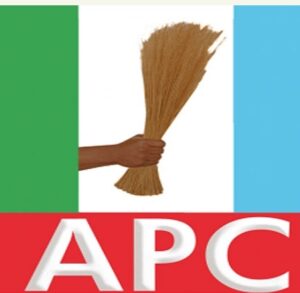Tensions Erupt in Lagos APC Over Local Government Candidate Selection
Tensions Erupt in Lagos APC Over Local Government Candidate Selection

Allegations of Candidate Imposition Spark Protests Across Councils as Party Stresses Consensus Strategy
A major internal conflict is unfolding within the Lagos State chapter of the All Progressives Congress (APC) ahead of the upcoming July 12 local government elections. Tensions have risen as several chairmanship hopefuls and party stakeholders are pushing back against what they describe as undemocratic attempts to impose candidates.
The discontent, which spans numerous Local Government Areas (LGAs) and Local Council Development Areas (LCDAs), centers on accusations that influential party figures are trying to sideline popular aspirants by handpicking candidates instead of allowing fair competition.
Following the Lagos State Independent Electoral Commission’s release of the official timetable in April for the 57 council chairmanship and 376 councillorship positions, the APC reportedly began implementing a consensus approach to select its candidates. Local party leaders formed internal committees to screen and endorse aspirants, aiming to streamline the process.
However, this move has triggered backlash from various quarters, with critics arguing the consensus strategy is being exploited to enforce preferred candidates, effectively stifling internal democracy.
In Ojokoro LCDA, three chairmanship aspirants were reportedly screened by a faction of party elders under the Ojokoro Apex Council, resulting in the selection of Mobolaji Sanusi as the consensus candidate. His endorsement was formalized in a letter co-signed by ex-House of Representatives members Ipoola Omisore and Adisa Owolabi and submitted to Lagos APC chairman Cornelius Ojelabi.
Despite the resolution, a rival faction put forward Rosiji Yemisi as their preferred candidate, fueling accusations of imposition. A member of this group, requesting anonymity, alleged that Yemisi was a political outsider being backed by Speaker of the Lagos House of Assembly, Mudashiru Obasa, warning that her candidacy could alienate voters.
A similar uproar occurred in Yaba LCDA, where community stakeholders accused the party of attempting to swap out a popular aspirant for Babatunde Ojo, who reportedly placed 11th in screening rankings. William Babatunde, the top scorer, is said to have secured 85% in the screening, compared to Ojo’s 65%.
Concerned residents, landlords, and political actors in Yaba petitioned First Lady Oluremi Tinubu and President Bola Tinubu, urging them to intervene and stop what they described as a repeat of harmful political practices that had previously stifled development.
“The community has capable leaders who can make informed, inclusive decisions,” the group stated, calling for a more transparent and democratic process that honors grassroots voices.
One aide, speaking anonymously, accused party officials of misleading members by claiming the President had directed specific candidate choices—claims the aide said were false and misrepresented the President’s stance on democratic values.
Opeyemi Ahmed, media aide to outgoing Agboyi-Ketu LCDA Chairman Dele Osinowo, expressed discontent in a since-deleted Facebook post. He warned that the lack of transparency and top-down decisions might hurt the party’s prospects in 2027.
“The party says it’s using consensus, but it feels more like imposition. If this continues, it could jeopardize Tinubu’s re-election bid,” Ahmed wrote.
Veteran APC chieftain Fouad Oki also voiced concern in an open letter, urging party leaders to prioritize internal democracy or risk losing the state to internal collapse.
“Power imposed is power at risk. The grassroots won’t forget exclusion. The APC must listen to its base—or suffer the consequences,” he warned.
Despite the outcry, APC’s Lagos Publicity Secretary, Seye Oladejo, denied any wrongdoing. He emphasized that the party’s primaries were still ongoing and that the consensus method is both constitutional and historically effective in reducing post-primary tensions.
“We haven’t finalized the process. Where consensus is reached, leaders must formally agree. Where it’s not, we go to the polls. No one is being imposed on anyone,” Oladejo stated.
He also defended the use of consensus, highlighting its role in maintaining party unity and resolving internal conflicts amicably.
TRENDING SONGS
 NNPC Boss Ojulari Bags UK Energy Institute Fellowship
NNPC Boss Ojulari Bags UK Energy Institute Fellowship
 Shock in Anambra: Bride Disappears Moments Before Wedding
Shock in Anambra: Bride Disappears Moments Before Wedding
 Nigerian Woman Returns ₦330 Million Accidentally Credited to Her Account
Nigerian Woman Returns ₦330 Million Accidentally Credited to Her Account
 APC Don Reach Morocco?’ VeryDarkMan Reacts to Seyi Tinubu Poster
APC Don Reach Morocco?’ VeryDarkMan Reacts to Seyi Tinubu Poster
 Bride Breaks Down in Tears as Wedding Meals Were Kept Secretly While Guests Go Home Hungry
Bride Breaks Down in Tears as Wedding Meals Were Kept Secretly While Guests Go Home Hungry
 Odogwu by Day, Robber by Night: How Marriage Joy Turned Into Tragedy
Odogwu by Day, Robber by Night: How Marriage Joy Turned Into Tragedy
 Nigerian Officials Allegedly Pocket N4–6B Weekly Through Smuggling Cartels at Seme–Badagry Border
Nigerian Officials Allegedly Pocket N4–6B Weekly Through Smuggling Cartels at Seme–Badagry Border
 Ahmad Yerima: Naval Officer to Face No Sanctions After Clash with Wike – Matawalle
Ahmad Yerima: Naval Officer to Face No Sanctions After Clash with Wike – Matawalle
 Trending Video: Muslim Man Joins Wife in Hallelujah Challenge ‘Dress Like Your Miracle’ Night
Trending Video: Muslim Man Joins Wife in Hallelujah Challenge ‘Dress Like Your Miracle’ Night
 Woman Seeks Advice as Late Brother’s Wife Refuses to Mourn Him Following His Death With Alleged Mistress
Woman Seeks Advice as Late Brother’s Wife Refuses to Mourn Him Following His Death With Alleged Mistress
Share this post with your friends on ![]()













